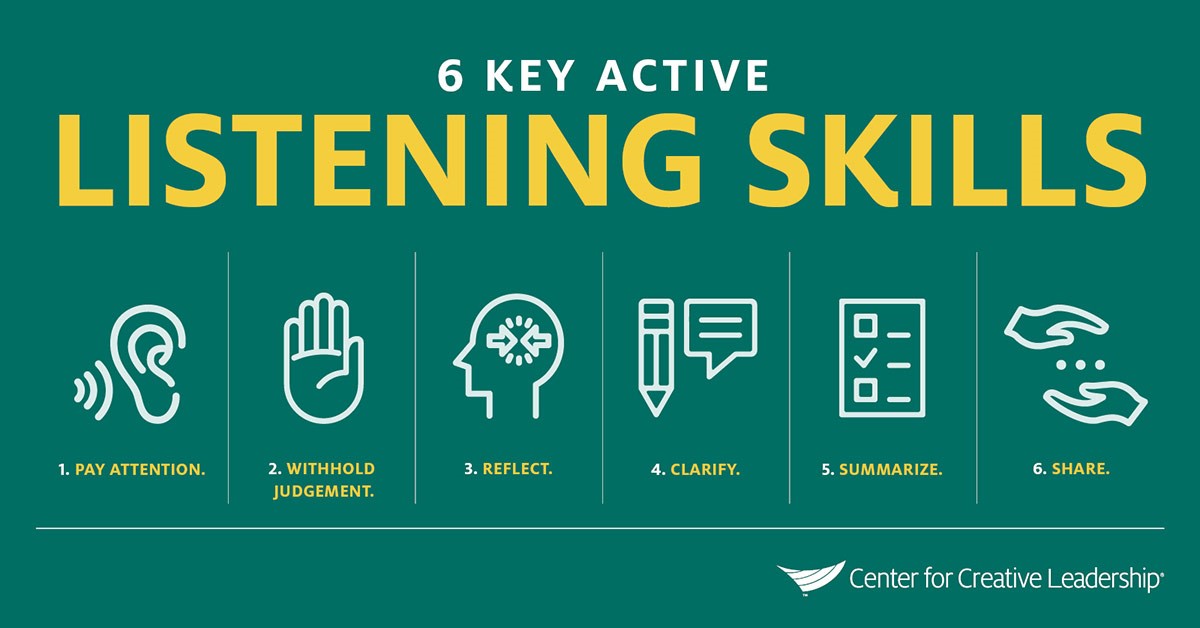“I feel like you aren’t hearing me.”
By Hannah Celinski
Have you ever found yourself saying this during a conversation with a colleague or a friend? In recent months, I have sat on a variety of committees and panels where I have experienced or observed obstacles to communication. I have also found myself misunderstood on occasion, and I’ve realized that part of the issue is not being clear, it’s being heard.
I facilitate 3-day sessions called Instructional Skills Workshops. I often run an exercise on the second day, where I have people pair off. First, they sit back-to-back and Speaker A tries to tell Speaker B a quick story. The room is loud, they can’t see each other, and the message quickly becomes garbled. When the pairs debrief, only small sections of information are retained.
Then they switch partners and Speaker B tries to tell a story, while Speaker A does everything they can, short of leaving the room, to avoid what they have to say. Again, not much is retained, and Speaker A often admits that they were so busy trying to get out of the room, they didn’t pay any attention to what Speaker B was saying.
Finally, the speakers sit face-to-face and engage in Active Listening techniques. The message clears up immediately, and information is exchanged fluidly.
The next time you find yourself sitting in a meeting, thinking only about what you are going to say next, consider doing this instead:
- listen carefully to what the other person is saying with no judgement one way or the other
- carefully consider their point, shelving the potential bias of your own opinion
- reflect on how their input might be useful with regards to the topic at hand
- clarify any points the speaker made that might seem out of place, or perplexing
- speak their points back to them to be sure you have understood their intention and nuance
- share your own perspective while building on their offering
Another way to foster success during meetings is to prepare a living document that identifies how the group wants to work together during the session, or over the course of the committee duration. Identifying strategies to navigate difficult subjects or dissent is paramount to success in these instances.
Consider adopting practices like “ouch,” “oops.” If someone says something hurtful, you acknowledge the moment by simply saying, “ouch.” The person who was speaking says, “oops,” then a conversation can unfold around the issue by addressing it before the meeting is derailed through misunderstandings or microaggressions. (You can find more about ouch/oops here: https://www.diversityinclusioncenter.com/archives/ouch_files/Archives/Ouch_Vol5No1.html )
Finding ways to communicate effectively is vital. I was reminded of the importance of these practices recently, as I found myself disengaging from a discussion to temper my anger. This resulted in a lack of engagement on my part, and I know I missed valuable information while I was bringing myself down to a workable mental space.
We expect our students to listen actively, but sometimes it is important to remind ourselves of the tenants of Active Listening, so we don’t end up tuning in for, “I feel like you aren’t hearing me.” You probably aren’t. Let’s instead aim for: “That was productive. Thank you all for listening.” I know I’ll be going into future meetings with this as my goal.
I’ve included further resources for Active Listening from The Centre for Creative Leadership here: https://www.ccl.org/articles/leading-effectively-articles/coaching-others-use-active-listening-skills/
You can find more about Effective Listening through the UFV Student Services here: https://ufv.ca/media/assets/counselling/Learning+from+Lectures.pdf
Interested in learning effective ways to communicate better> At UFV, we offer a Professional Communications Certificate. To find out more information, go to ufv.ca/communications.

